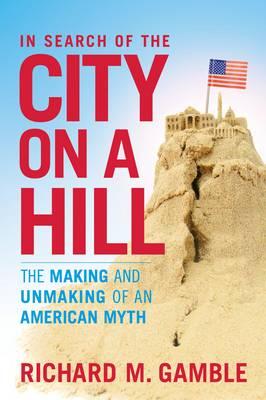Jesus’ words to his followers about the city on a hill, coming between references to salt without savor and the futility of hiding a light under a bushel, are admonitory, not congratulatory. Those upon whom the light has been bestowed are not to regard themselves as elevated, nor are they instructed to build a city. Rather, they are to “let your light so shine before men, that they may see your good works, and glorify your Father which is in heaven.” It is a metaphor—Christians must work to make the good news as visible to mankind as a high city.
In an earlier book, The War for Righteousness, Richard Gamble related how the liberal, progressive, humanity-saving segment of the American clergy repositioned themselves as ruthless (armchair) war-makers in support of the World War I “crusade for democracy.” His latest work, a mild-mannered but incisive tour de force of intellectual history, examines a particular aspect of American self-perception—and finds it seriously problematic.
A summary can hardly do justice to Professor Gamble’s rich and thorough scholarship as he traces the city on a hill’s “journey from biblical metaphor to nationalist myth” with canonical status in the American civil religion. A view of a few salient points will have to serve here.
The journey begins in 1630, when John Winthrop, on shipboard in the Atlantic, tells the company of Puritans he is leading “that we must consider that we shall be a City upon a Hill.” These words form only a small bit of Winthrop’s discourse, “A Model of Christian Charity,” and again they are not celebratory. The settlers of Massachusetts must strive to make their new country noted for its godly behavior as they begin their “Errand into the Wilderness.” Winthrop likely had in mind the skepticism of the Puritans who had stayed behind and the dangers that the wilderness might pose for godly behavior.
Alas, given the Puritan character, it was not too much of a stretch for Massachusetts to begin thinking of itself as unique in history, a divinely endowed model of superior virtues, a beacon for all mankind. In the next century, Jonathan Edwards told New England, “We are a city set on a hill, and the honour of God doth greatly depend on our behaviour.” In the following centuries the sons of Massachusetts labored mightily and with much success in every forum of American discourse to make America a synonym for Massachusetts. They kept this pretense up long after they had traded in their Bibles for Unitarianism and Emerson’s Oversoul. To this day when anyone says “America,” the image of Massachusetts comes reflexively to many minds. So, another short step, and America (think Massachusetts) is the city on the hill.
Even so, Winthrop and his city garnered rather slight and occasional notice through the 19th century. However, though the metaphor was not used, the idea of America being exceptional and exemplary gathered strength—as most notably exhibited in the Gettysburg Address and “The Battle Hymn of the Republic.” But the city on a hill as the image of American exceptionalism did not really begin to gain great traction until January 1961, when speechwriters for president-elect John F. Kennedy gave him a farewell address to read to the Massachusetts legislature. The “democratic institutions” of Massachusetts, said Kennedy, “are beacon lights for other nations as well as our sister states.” He went on to compare his state to Periclean Athens: “We do not imitate—for we are a model to others.” In his presidential tasks, Kennedy promised, he would be guided by the goal set by John Winthrop more than three centuries before. The city on a hill, it seems, was Camelot.
Twenty years later, the city on a hill was adopted by Ronald Reagan. He had come across Winthrop’s phrase, and he used the image many times in his feel-good campaign to restore optimism to the American people. Reagan made the city on a hill forever his own and added the adjective “shining” as a permanent part. The liberals did not object to America as a shining city on a hill. It was part of their religion, too. They just did not like the particular layout of Reagan’s metropolis. Intentionally or not, we now have America conflated, probably beyond recall, with Christianity. Many people, I fear, cannot tell the difference, although our city on a hill, a rather self-satisfied and prideful place, has little use for glorifying our Father which is in heaven. Caesar’s flag hangs in many churches, while the Lord’s Commandments are forbidden in Caesar’s precincts.
Professor Gamble, a model of the careful and moderate scholar, does not go this far, but has not Americanism become a Christian heresy? And is not this heresy, like Islam, turning its back on Christ altogether and setting up as a faith all its own? And is not such a vague Christless faith just the sort of religion used by rulers to hold together the motley population of a multicultural empire—like the worship of Roman emperors?

Leave a Reply